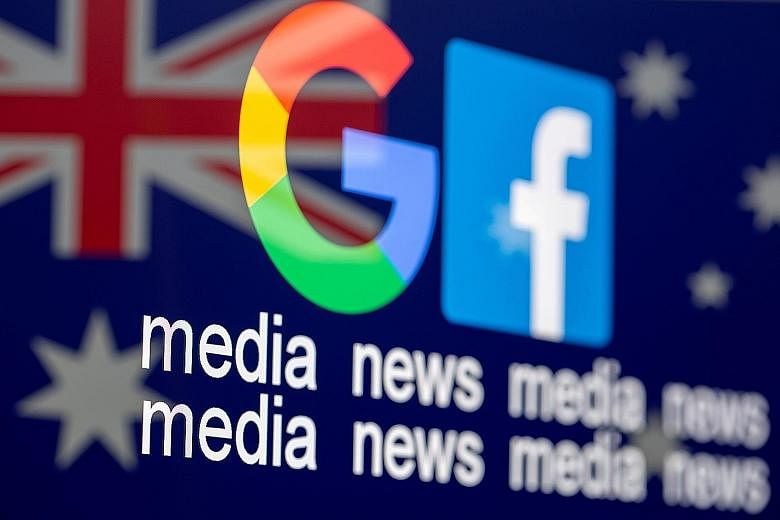CANBERRA • Australia's Parliament has passed a law to make Alphabet's Google and Facebook pay media companies for content on their platforms in reforms that other countries are looking to replicate.
After robust negotiations in which Facebook blocked all news content in the world's 13th-largest economy, the vote yesterday makes Australia the first nation where a government arbitrator can set the price that tech giants pay domestic media if private talks fail.
"The code will ensure news media businesses are fairly remunerated for the content they generate, helping to sustain public interest journalism," Treasurer Josh Frydenberg and Communications Minister Paul Fletcher said in a joint statement.
Facebook's news ban, which also blacked out many non-profit and government pages, including those of public health agencies promoting reliable information about Covid-19, would be lifted the following day, Mr Frydenberg added in a radio interview, eight days after the measure takes effect.
The new law sets the stage for a dispute-handling process largely untested in corporate Australia, should negotiations between Big Tech and media companies fail.
Both sides claimed victory after Australia offered Facebook some concessions, including government discretion to release the tech giants from arbitration if they can prove a "significant contribution" to the domestic news industry.
The revised code also allows the tech companies a longer period to cut media deals before the state intervenes. It will be reviewed within a year of taking effect, the joint statement said, but gave no start date.
For months, Facebook and Google threatened to pull core services from Australia if the law took effect. But in the days before the vote, and before Facebook blocked news, Google struck some deals with publisher News Corp.
Several large Australian media companies, including Seven West Media, Nine Entertainment and the Australian Broadcasting Corp, have said they were in talks with Facebook.
While the threat of legislation has forced the tech giants to the table, the concessions mean Facebook can essentially follow a template it has used in the United States and Britain, and pay Australian publishers to populate its News tab.
In a blog post celebrating the compromise, Facebook vice-president of global affairs Nick Clegg said the company plans to spend US$1 billion (S$1.3 billion) globally over the next three years supporting the news industry.
Analysts say such deals will likely favour the top end of town, with smaller publishers missing out.
"It does now seem to be a law without a pointy end," said Dr Belinda Barnet, a senior lecturer in media at Swinburne University of Technology in Melbourne.
Professor of law Daniel Gervais at Vanderbilt University said that at the heart of the dispute is the distribution of online advertising dollars. "There is only so much online income available for everybody," he said.
In acceding to pay some news publishers, and securing for itself the freedom to choose which ones, Facebook is making a small sacrifice to keep its larger ad empire intact. The company had more than US$85 billion in revenue last year, almost all of it coming from online advertising. Its net income in the fourth quarter alone was sufficient to fund 10 of the billion-dollar three-year plans it has announced.
Australia sought to and succeeded in nudging the platforms to share a slice of the revenue.
REUTERS, BLOOMBERG

